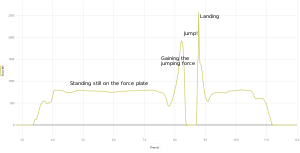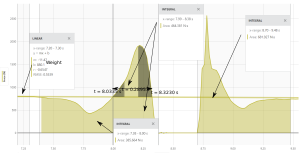Eksperimentti: hyppykorkeuden määrittäminen impulssilla: Difference between revisions
From wikiluntti
| Line 28: | Line 28: | ||
\begin{align} | \begin{align} | ||
m &= 880 N /9.81 = 89.7 kg \\ | m &= 880 N /9.81 = 89.7 kg \\ | ||
J &= | J &= 700 Ns | ||
\end{align} | \end{align} | ||
</math> | </math> | ||
| Line 37: | Line 37: | ||
\begin{align} | \begin{align} | ||
h &= \frac{J^2}{2gm^2} \\ | h &= \frac{J^2}{2gm^2} \\ | ||
&= \frac{( | &= \frac{(700 Ns)^2}{2 \times 9.81 m/s^2 \times (89.7 kg)^2 } \\ | ||
&= \frac{ | &= \frac{490000}{8046.09} \\ | ||
&= | &= 60.9 m\\ | ||
\end{align} | \end{align} | ||
</math> | </math> | ||
Revision as of 17:48, 3 May 2022
Introduction

Jumping on the force plate you can feel the force. We use time of flight method to estimate the height of the jump.
Theory

Impulse . Actually is our takeoff speed because , and we have . Because and thus we have because and . However, for the velocity we have and at the maximum height we have that , and thus and . Combining these two we have
Example
The example gives
and thus we have
References
https://www.thehoopsgeek.com/the-physics-of-the-vertical-jump/
https://www.brunel.ac.uk/~spstnpl/LearningResources/VerticalJumpLab.pdf














